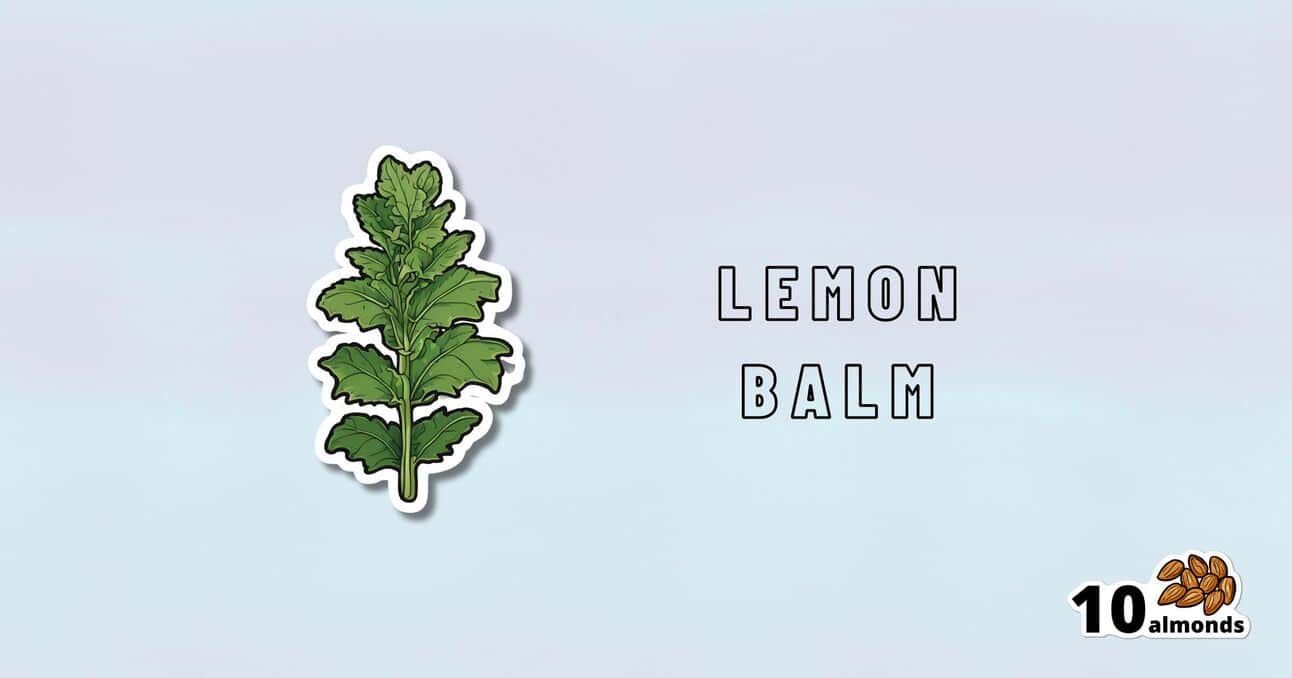Lemon Balm For Stressful Times And More
Dive into the calm: Lemon balm’s potential to ease stress, enhance cognition, and assist with sleep is backed by science. Plus, safety and alternative options explored!

Balm For The Mind: In More Ways Than One!
Lemon balm(Melissa officinalis) is quite unrelated to lemons, and is actually a closer relative to mint. It does have a lemony fragrance, though!
You’ll find it in a lot of relaxing/sleepy preparations, so…
What does the science say?
Relaxation
Lemon balm has indeed been found to be a potent anti-stress herb. Laboratories that need to test anything to do with stress generally create that stress in one of two main ways:
- If it’s not humans: a forced swimming test that’s a lot like waterboarding
- If it is humans: cognitive tests completed under time-pressure while multitasking
Consequently, studies that have set out to examine lemon balm’s anti-stress potential in humans, have often ended up also highlighting its potential as a cognitive enhancer, like this one in which…
❝Both active lemon balm treatments were generally associated with improvements in mood and/or cognitive performance❞
~ Dr. Anastasia Ossoukhova et al.
Read in full: Anti-Stress Effects of Lemon Balm-Containing Foods
And this one, which found…
❝The results showed that the 600-mg dose of Melissa ameliorated the negative mood effects of the DISS, with significantly increased self-ratings of calmness and reduced self-ratings of alertness.
In addition, a significant increase in the speed of mathematical processing, with no reduction in accuracy, was observed after ingestion of the 300-mg dose.❞
The appropriately named “DISS” is the Defined Intensity Stress Simulation we talked about.
Sleep
There’s a lot less research for lemon balm’s properties in this regard than for stress/anxiety, and it’s probably because sleep studies are much more expensive than stress studies.
It’s not for a lack of popular academic interest—for example, typing “Melissa officinalis” into PubMed (the vast library of studies we often cite from) autosuggests “Melissa officinalis sleep”. But alas, autosuggestions do not Randomized Controlled Trials make.
There are some, but they’re often small, old, and combined with other things, like this one:
This is interesting, because generally speaking there is little to no evidence that valerian actually helps sleep, so if this mixture worked, we might reasonably assume it was because of the lemon balm—but there’s an outside chance it could be that it only works in the presence of valerian (unlikely, but in science we must consider all possibilities).
Beyond that, we just have meta-reviews to work from, like this one that noted:
❝M. officinalis contains several phytochemicals such as phenolic acids, flavonoids, terpenoids, and many others at the basis of its pharmacological activities. Indeed, the plant can have antioxidant, anti-inflammatory, antispasmodic, antimicrobial, neuroprotective, nephroprotective, antinociceptive effects.
Given its consolidated use, M. officinalis has also been experimented with clinical settings, demonstrating interesting properties against different human diseases, such as anxiety, sleeping difficulties, palpitation, hypertension, depression, dementia, infantile colic, bruxism, metabolic problems, Alzheimer’s disease, and sexual disorders. ❞
You see why we don’t try to cover everything here, by the way!
But if you want to read this one in full, you can, at:
An Updated Review on The Properties of Melissa officinalis L.: Not Exclusively Anti-anxiety
Is it safe?
Lemon balm is generally recognized as safe, and/but please check with your doctor/pharmacist in case of any contraindications due to medicines you may be on or conditions you may have.
Want to try some?
We don’t sell it, but here for your convenience is an example product on Amazon 😎
Want to know your other options?
You might like our previous main features:
What Teas To Drink Before Bed (By Science!)
and
Safe Effective Sleep Aids For Seniors
Enjoy!
Share This Post
Learn To Grow
Sign up for weekly gardening tips, product reviews and discounts.




